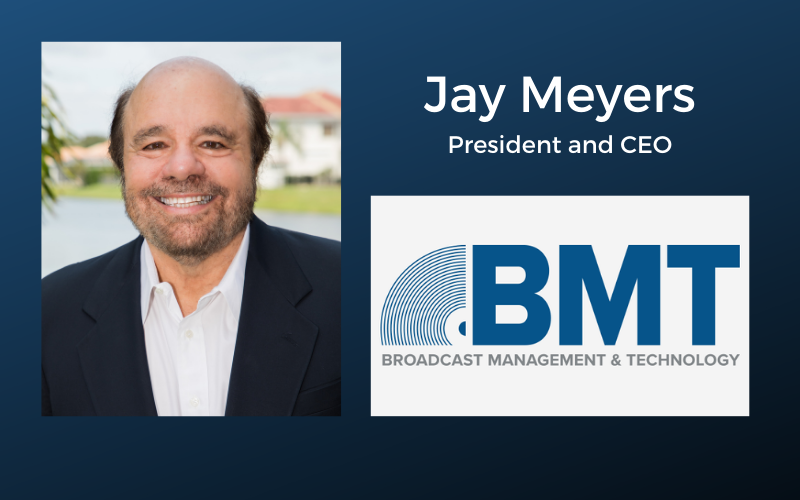By Jay Meyers
President and CEO, Broadcast Management and Technology
I truly learned about budgeting when I walked into a Department Head meeting at my first major market radio station a month after I became the program director. The general manager announced it was time to budget for the next year and handed out a 13 column accounting spreadsheet to each department head with the expense items they were responsible for on the left and the months across the top and said “I’ll need your budget requests back to me in three weeks.” And though I was a novice, I was able to accomplish that task because I was also given historical data for my department from the last three years. And my department budget merged with other departments, which merged with sales forecasts that were prepared the same way.
And though the years have come and gone, and my responsibilities increased to running companies as the CEO, and handling a half billion dollar region of the industry’s largest company, at its very basic how I did budgeting remained the same. Although 13 column spreadsheets have given way to individual tabs in Excel, I have always required my companies to start at the very basic level, each department submitting their own expense budget, each sales person working on an account by account basis preparing their proposed budget which merges into each station or cluster’s goals.
But what about 2021? We are in a Covid controlled economy, our industry has taken 40, 50 even 60% hits in monthly revenue. Of what true value is 2020 history when preparing next year’s budget? The cold fact is there is only one answer to that question, and the answer is “absolutely nothing”. Regardless of where you are in your process as you read this, the only proper way to approach 2021 is to have a universal goal and then put a business plan together to try your best to achieve it. Spending hours and hours of your employee’s time preparing the 2021 budget is non-productive. Let me explain to you why.
If I said to you that the goal for next year is to grow the business back to 2019 levels, I’m sure you would agree that would be a fairly good goal. How about if I said to you that the goal next year is to grow the business over 33%. Your response would be “that’s impossible, that can never be done”. But if your business this year was off 25% from 2019, the two goals mentioned in this paragraph are exactly the same. It’s simple math, if you lose 25%, you must grow over 33% to get back to the previous level.
Those kind of numbers in an Excel spreadsheet will literally scare the average salesperson to death. The truth is that your employee’s time this year is far better spent out on the streets selling, your staff being a resource to your clients, being creative and closing business. Spending hours and hours of useful time preparing a budget in an uncertain economy is more for style than substance and is more about process than performance. I have always felt strongly that the most successful companies focus on performance, and the less than best, the mediocre or worse companies spend a lot of time focusing on process.
So, what do you do? We need goals, we need some kind of budget to define the rules of engagement. How do we define a business plan for 2021? Here is a step by step idea.
- Lay in your 2019 final revenue figures in your initial budget pass
- On the expense side, lay in your average monthly run rate June-October (with sales costs loading in based on the revenue figures). The assumption here is that by June you would have adjusted your business to Covid expense levels.
- If you have reduced salaries of current employees, adjust their salary back to pre-Covid levels
- Remove the typical columns of previous year (2020) and percent change as they are not relevant for all the reasons mentioned above.
At this point you will have a reasonable first pass working budget. Now is the time to get your senior team involved.
- Have your sales manager(s) review the monthly revenue figures to see if they make sense based on where your business currently sits. Ask them to make adjustments by moving revenue between months while retaining the total yearly goal.
- Review your projected 2021 bottom line compared to 2019 to see if it is truly reasonable. It is highly likely that your initial pass will produce a significantly larger BCF number than 2019 because you will be running at your new normal expense level
- Make a reasonable decision as to what would be a good target bottom line in the current climate.
- Make adjustments to either revenue (minus) or expenses (plus – but only if the additional expense is actually going to enhance your capability to make the revenue numbers) to achieve the reasonable BCF number you have chosen.
Now you have your second pass budget and are pretty close to being done.
- With your senior team, review your prepared 2021 budget one more time and make any changes that seem necessary. If you have done the first two passes correctly, it’s likely you’ll have few to none.
- Have your sales manager(s) determine what portion of the revenue budget each salesperson is responsible for and give them their goals.
- Ask each sales person for their business plan (on an account by account basis) for achieving those goals. In a normal budget cycle, this would have been one of the first steps, but in Covid world, it becomes the final step.
And now you’re done, and ready to get to work in 2021 on re-growing your business. By doing it this way, instead of taking your sales team off the streets during this critical time, their time will be spent creating revenue. Their business plans can be due back to you on December 30th and be prepared during the traditional down time making your overall effort for the rest of the quarter more productive.
A couple of quick thoughts on operating in 2021.
- If you are operating on reduced salaries, do not return people to 100% on January 1st just because that is how you prepared your budget. Make the adjustment when your revenue performance warrants it. You’ll have expense savings earlier in the year but will have the correct amount budgeted when/if your revenue warrants it.
- Think long and hard about what you learned while operating in 2020. Covid has reshaped many industries operating norms, and we are no exception. Decide which changes have caused hardship and which changes have been good for your business and proceed accordingly. Look for opportunities to return to the old way in the hardship cases and allow the good cases to become your new normal.
Wishing you great success in the year ahead and offering the following:
Now, perhaps more than ever, station owners need fresh ideas which usually come from engaging outside expertise that they cannot afford. I have over three decades of experience in the industry and during my career I have been involved in one way or another with over a thousand stations, in more than 200 different markets and touching at one time or another all 50 States and seven foreign countries. In non-Covid times, I typically have a literal waiting list of project requests. Although my business remains solid with long time legacy clients, I do have significant time that I reserved for new projects to devote to helping the industry recover.
I am offering the following to members of the Massachusetts State Broadcaster’s Association:
- A free initial phone or zoom consultation
- If an interest is developed via the initial talk, greatly discounted rates to any active member.
It’s really pretty simple. The future health of my business is directly related to the long term health of the your business and I want to do whatever I can to move the industry forward.
I would encourage you to visit my company website at www.bmtllc.com to learn more about me and the services my company offers. And feel free to email me at jaymeyers@BMTllc.com or call me at (859) 653-4630 if you have any questions about this article.
Stay healthy and safe!



